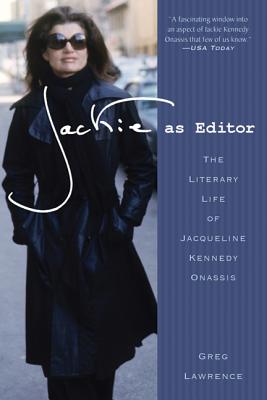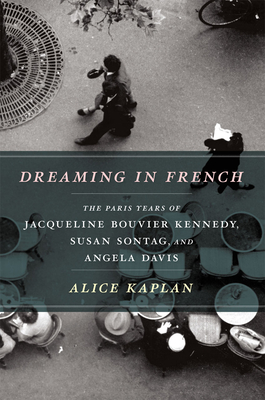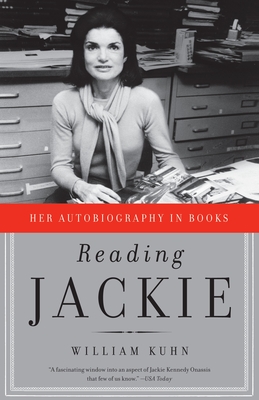Petya Grady writes about books, art and style at The Migrant Bookclub. The Eastern Europe of her childhood is a frequent point of departure as she explores issues of place, identity, memory and (un)-belonging. She currently lives in Memphis, TN with her husband. I am on a Jackie O kick recently. This comes as a surprise to me so, naturally, I want to talk about it. I grew up in Bulgaria and moved to the States for college in '99. I went to a small private school in rural Tennessee and even though I majored in Political Science, there was not a single thing in my life that ever signaled to me that I should be curious about the former First Lady. Heck, I didn't even care much for her style. Where I come from, a black turtle neck is considered the epitome of chic and although I don't think Jacqueline would have hated that, I did not think we would have much to talk about if we were to ever meet. Until.
About two years ago, I noticed that the New York Times was reviewing not one but two biographies of Jacqueline that focused on her years as a book editor. It came as quite of a surprise to my bookish self. Not only had I never even heard that Ms. O had ever held a job in her life but now I was faced with the very rare experience of having to choose between two books on that very same subject, coming out at the exact same time. What were the chances?!
I picked up William Kuhn's "Reading Jackie" because I liked the cover better. (Please tell me you do that too!!!) Kuhn is straight-forward about the fact that he never had any personal contact with Jackie and that he had very limited access to any of her personal artifacts and/or memorabilia. Jacqueline after all is notorious of her privacy. However, he makes the argument that when one looks at the books she worked on as an editor, first at Viking and then at Doubleday, one can learn quite a bit about her taste, her interests, and her personality. It's the autobiography she never wrote, he says! Reviewers have questioned the rigor of Mr. Kuhn's research and described his work as quite speculative, BUT, the book did leave me with this great feeling of wonder and surprise about its famous subject---a woman touched by so much sadness and tragedy and yet unchanged in her appreciation for beauty, literature and art. What books did she edit, you are probably wondering? William Kuhn's has shared the complete list on his website but here are some highlights: The Firebird and Other Russian Fairy Tales by Boris Zvorykin, My Book of Flowers by Princess Grace of Monaco, Secrets of Marie Antoinette by Olivier Bernier, Blood Memory by Martha Graham (Graham's autobiography). The range in format and subject matter is astounding and Jacqueline comes across as a woman of infinite curiosity and professional drive---so different from her rather vapid public image as a stylish {but somewhat ostentatious} woman.
 I've read parts of the book many times since and gifted it more times than I care to remember. I obsessed over it so much that it wasn't actually until I started writing this piece, that I recalled I never went back and picked up the second book that came around that same time---Greg Lawrence's "Jackie as Editor." I've been re-reading some of its reviews and realizing that it may actually be the stronger book of the two. It documents Jackie from the perspective of her co-workers and HER BOSS and is based on Lawrence's meticulous study of her in-line edits, letters and notes she sent to numerous writers, artists, photographers. It sounds so delicious (if a little gossipy) that I am fairly certain I will go ahead and order it as soon as I am done telling you about it.
I've read parts of the book many times since and gifted it more times than I care to remember. I obsessed over it so much that it wasn't actually until I started writing this piece, that I recalled I never went back and picked up the second book that came around that same time---Greg Lawrence's "Jackie as Editor." I've been re-reading some of its reviews and realizing that it may actually be the stronger book of the two. It documents Jackie from the perspective of her co-workers and HER BOSS and is based on Lawrence's meticulous study of her in-line edits, letters and notes she sent to numerous writers, artists, photographers. It sounds so delicious (if a little gossipy) that I am fairly certain I will go ahead and order it as soon as I am done telling you about it.
 The book that got me back on this track, however, is Alice Kaplan's recent "Dreaming in French: The Paris Years of Jacqueline Bouvier Kennedy, Susan Sontag, and Angela Davis". Kaplan draws a surprising group portrait of three of America's most memorable women and sets it in the beautiful, romantic, daunting, lush, and sometimes seedy city of Paris where all three spent significant amounts of time in their most formative years. Each part of the book is wonderful for so many reasons but Jacqueline, again, charmed me most completely for her earnest pursuit of PARIS and herself. Of her time there, she would write later in her essay for a Vogue student writing contest, "I learned not to be ashamed of a real hunger for knowledge, something I had always tried to hide." Which, of course, broke my heart a little bit but also made me so happy for her because I knew that after college, after Camelot, and after always being defined as some important man's beautiful significant other, she would grow old in a way that completely nurtured her constant hunger for knowledge without even trying to pretend it was necessary to hide it.
The book that got me back on this track, however, is Alice Kaplan's recent "Dreaming in French: The Paris Years of Jacqueline Bouvier Kennedy, Susan Sontag, and Angela Davis". Kaplan draws a surprising group portrait of three of America's most memorable women and sets it in the beautiful, romantic, daunting, lush, and sometimes seedy city of Paris where all three spent significant amounts of time in their most formative years. Each part of the book is wonderful for so many reasons but Jacqueline, again, charmed me most completely for her earnest pursuit of PARIS and herself. Of her time there, she would write later in her essay for a Vogue student writing contest, "I learned not to be ashamed of a real hunger for knowledge, something I had always tried to hide." Which, of course, broke my heart a little bit but also made me so happy for her because I knew that after college, after Camelot, and after always being defined as some important man's beautiful significant other, she would grow old in a way that completely nurtured her constant hunger for knowledge without even trying to pretend it was necessary to hide it.


